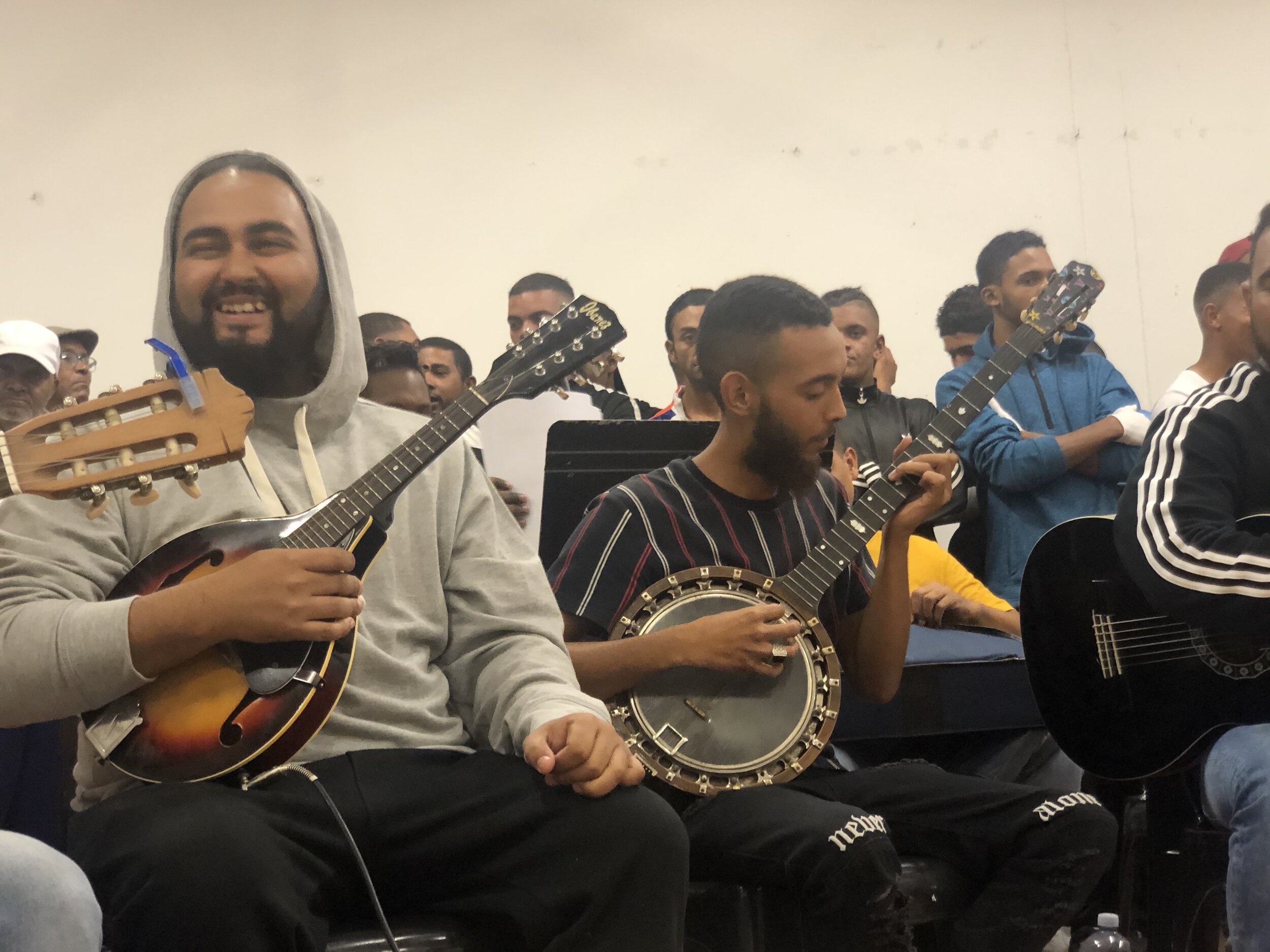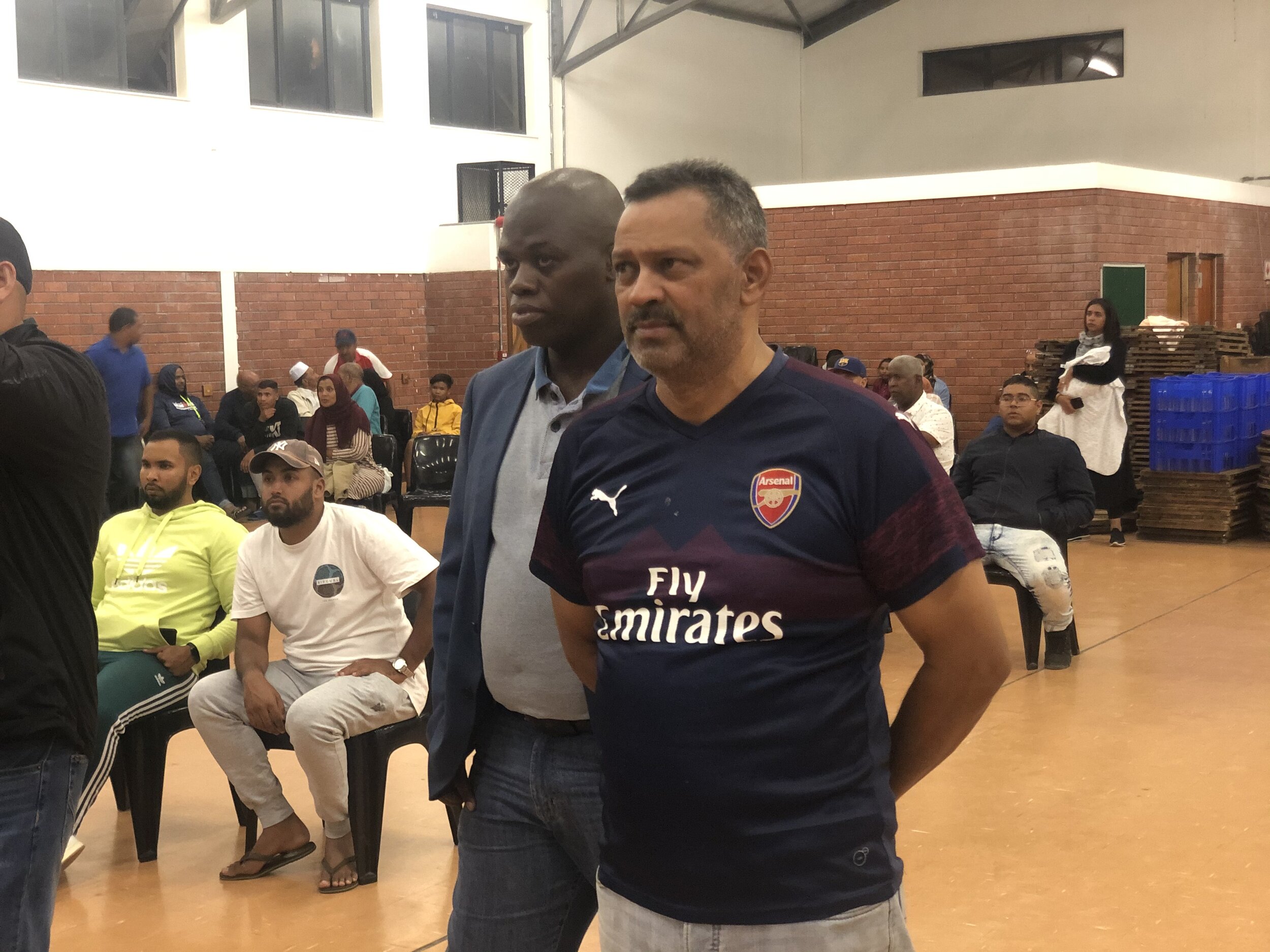The Cape Malay String Band Choirs of Cape Town
South Africa is more than halfway through its five-week COVID-19 lockdown, but about a month and a half ago, one of the more remarkable musical competitions in the world was in full swing in Cape Town. The Cape Malay Choir Board Annual Choral Competition is an important event for the thousands of singers and string bands from the Cape Flats neighborhoods that stretch out between mountain and sea in Cape Town.
In a city known for its contrasts and diversity, the Cape Malay Choir scene stands for its mindbogglingly rich mix of traditions and musical styles, yet it remains pretty unknown outside Cape Town – even many South African friends of mine had never heard of it. Check it out:
A “Nederlands Lied”
The Cape Malay people are an Afrikaans-speaking Muslim community in Cape Town that trace their origin to waves of Indonesian slaves, South Asian communities, and native African people. Their choral music is a pure product of this amazing cultural mix with roots stemming all the way back to the original Dutch occupation of South Africa in the 1700s. All-male choirs with booming harmonies combined with vocal soloists singingly with distinctly “Arabic” ornamentations and inflections. It is completely unique (and sung entirely in Afrikaans).
But I been drawn to this music for a while, because, well:
BANJOS.
Yes, not only banjos. But entire string bands: upright bass, guitar, mandolin, and homemade Cape Malay six string banjos. The mix of a full choir with a string band just adds to the coolness of this music.
These bands are deeply rooted in the “Cape Malay” communities of the Cape Flats – known globally for its ultra-violent prison gangs just a mile away from the idyllic beaches, hipster coffee joints, and noodle bars of Cape Town proper. These coloured communities lived in the hilly Bo-Kaap neighborhood in Cape Town (known for its multi-colored houses) but were relocated by the apartheid government to the dry, flat, and dusty Cape Flats. But in these hardscrabble communities the Cape Malay culture has flourished.
The Cape Malay Choir Board Competition is a massively important event for this community, on the heels of the more well-known Kaapse Kloppe Cape Town Carnival right after the New Year. Choirs - with classy names like the “Ottomans” or the “Young Caballeros” -practice all year for finals, which this year took place in the massive Belleville Velodrome. While in Cape Town in February, I was extremely lucky to be able to make one of these practices after reaching out a musician on facebook – unfortunately I missed the competition but the practice allowed me to have an even more intimate look into this wonderful music.
I was put in touch with the Chairman of one of these choir clubs, Mr. Faadiel Waggie, a successful businessman and respected community member who is a self-taught singer, conductor, and all-around great guy. Without hesitation Faadiel and his Vice-Chair Mrs. Saadeqah Simon organized for my visit to a primary school where the practice was taking place in a suburb in the Cape Flats.
And just like that I was invited to a practice session of the well-known Cape Malay group the “Young Caberellos.”
I went out to the primary school after a long week of work with a good friend of mine from Durban but now living in Cape Town. Suffice to say, he was a bit more nervous than myself about visiting the Cape Flats. We had just spent the day in Cape Flats neighborhoods doing work on HIV/AIDS – while all was peaceful the walls were dotted with gang graffiti from the notorious Cape Town prison gangs – the 26s, 27, and 28s. These neighborhoods are some of the most violent in the world.
But we felt nothing remotely scary as we pulled into the large primary school, with families and people of all ages, milling about in the dark getting ready for the all-important last practice. The Choral Competitions had already begun, and you could feel the (friendly) tension in the air as the chorus worked to perfect their pieces for the following competition round that weekend.
Chairman Waggie and Vice-Chair Saadegah received me, introducing me to countless members, especially to the banjo players. The Chairman explained that competitions include three choral and two soloist items and groups are judged according very stringently. The tradition must be maintained!
Two pieces feature the banjo: The "Nederlands Lied" (or “Dutch Song” in Afrikaans, which is a traditional Cape/Dutch song) and the compical "Moppie" song. The Nederlands Lied absolutely floored me and quickly became one of the coolest things I’ve ever heard. The video at the top of this blog features one Lied singer who was trained by Chairman Waggie. Here he shows him how it’s done:
The string band just adds to this amazing texture of voices, with mandolin carrying a tasteful counter-melody and the banjo – well, just being a banjo! The “Moopie” song was super interesting – it was much less solemn than the Lied, seemed to be light-hearted. The choir members even put on white gloves.
According to Choir member Thaabied Dante, “the moppie is derived from the era where slaves used funny songs as a means of communicating their current lifestyles which their slave masters otherwise would not allow and understand.” The Caberellos took a good deal of time working out the intricate arrangements, while also featured a sting section (unlike the Lied, which just had a string band).
As I said, I unfortunately missed the competition – where the Choirs compete, dressed to the teeth in suits and fezzes. But as almost everywhere else in the world, COVID-19 took the breath away from even the Malay Choir scene as bands took social-distancing and the responsible. Malay Choir associations called to stop the spread of COVID-19.
Luckily there are many resources on this style on the internet, especially on social media spread by the Choirs themselves and their many social media pages (start here: https://www.facebook.com/groups/98713196428/). Make sure to visit them for the real deal!
As I left the amazing practice (eventually to be picked up by a massively perplexed Uber driver), I shared some final words with the Chairman. He hopes that more people in the world music community pick up on this great musical style, which includes everything that makes the rainbow nation so awesome. Hopefully when things pick up we’ll start hearing more about these voices!














A journey into the Montes de María mountain range to hear the other-worldly sounds of the Gaita